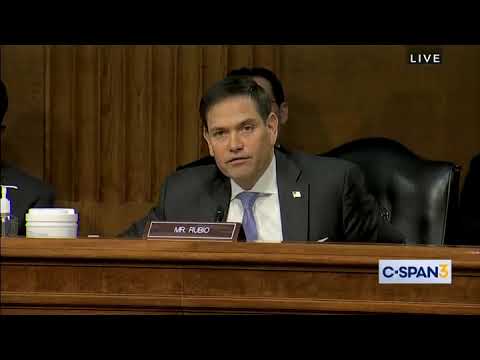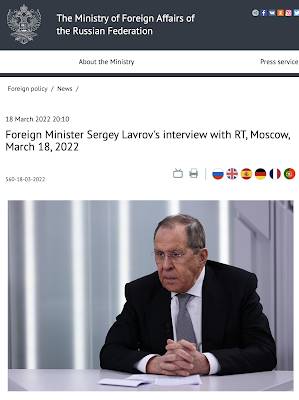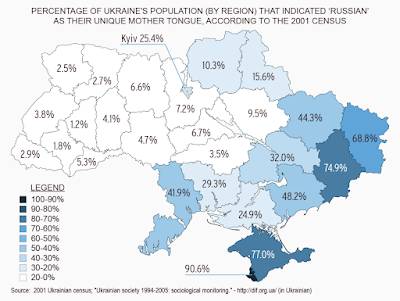
On March 18, 2022, Sergey Lavrov gave an interview with Russian Television or RT regarding the current situation in Ukraine among other issues. Let's look at some of the key takeaways from this question and answer session with my bolds throughout:
Question: The sanctions that are currently imposed on Russia are of course unprecedented. And they are really negatively affecting the lives of ordinary Russians, even though Washington is saying that it’s not targeting Russians. What can you say about what the goals of these sanctions are and who the target really is?
Sergey Lavrov: I believe the goal of the sanctions is much more strategic than just Ukraine. I think what we witness in Ukraine is the quintessence of the western course, strategic course to marginalise Russia, to contain Russia, to stop Russia’s development and to reduce Russia to a zero role in world politics and world economy, world trade, world sports, art, science, education. And we observe unprecedented steps our Western colleagues are taking. One of the underlying trends is the United States’ desire – which has been much more manifested by the Biden administration – to come back to a unipolar world….
The latest sanctions wave was really unprecedented and, as President Putin recalled, we are now champions in the number of sanctions introduced against the Russian Federation – more than 5,000 individual acts, almost twice as many as was introduced against Iran and North Korea. But sanctions, or all of this, made us stronger….
If you wish to see all of Washington's anti-Russia sanctions, please click on these two links:
1.) Russian Harmful Foreign Activities Sanctions.
2.) Ukraine- /Russia-related Sanctions.
If the past eight years have taught Washington anything it's that Russians are not about to change the trajectory of their nation and their leadership just because the Obama, Trump and Biden Administrations all think that it's a great idea.
So, coming back to sanctions: sanctions we will survive. The measures which the president and the government are developing, elaborating, are being announced. This is only the beginning of our economy getting adjusted to the new situation. After 2014, as I started to say, we did gain experience to rely upon ourselves. And the biggest lesson from this particular historical period is, unlike what we saw after 2014, that now, if there was any illusion that we can one day rely on our Western partners, this illusion is no longer there. We will have to rely only on ourselves and on our allies who would stay with us. This is the main conclusion for Russia in the context of geopolitics.
He goes on to note that, while the leaders of both Germany and France keep repeating that they want autonomy for the European Union from the diktats of Washington, in fact, he believes that that is highly unlikely.
Lavrov also observes the following about Ukraine which clearly outlines one of the reasons why Russia took action when it did, keeping this in mind:
The idea that Russians should get out of Ukraine is still very much on the minds of politicians in this country. Oleg Tyagnibok, the leader of the ultra-radical party, Svoboda (“Freedom”), has repeatedly said that “we must have de-Russification”, as he calls it. And de-Russification means that ethnic Russians must not have their own language, history and identity in Ukraine and so many similar things. But what is more important for us to understand in the current state of play are these statements by Zelensky himself. So I said that the ultra-radicals called for Russians to be wiped out of Crimea, and President Zelensky, in September last year, said, if you believe you’re a Russian, if you believe you want to be a Russian and if you want to be friendly with Russia, go to Russia. He said this just a few months ago.
Having travelled through Russia twice in the past eight years, meeting and talking with Russians who, as I have said in the past, are just like us in so many ways but yet have a culture that is uniquely Russian, I found this question most interesting:
Question: I think it’s safe to say that Russian culture specifically has become accustomed to being part of, you might say, a global village of countries that share deep economic ties and enjoy travelling between each other. How do you think these sanctions are going to influence the everyday life of Russians in the long term in relation to that
Sergey Lavrov: Well, as I said, the assessment of what is going on, in my view, clearly indicates that what America wants is a unipolar world, which would be not like a global village, which would be like an American village and maybe American saloon where who is strongest is calling the shots. And they said they are succeeding to mobilize behind themselves and, on the basis of their own interests, the entire Western world, which is indicative of how independent NATO members and European Union members are and which is indicative of what place the European Union, as I said, would have in the future configuration of the world situation and the world system.
There are players who would never accept the global village under the American sheriff, and China, India, Brazil, Argentina, Mexico – I am sure these countries do not want to be just in the position where Uncle Sam orders them something and they say “Yes, sir.” And of course, Russia is not in the category of countries who would be ready to do so….
So we will be, as always, open to cooperation with anyone who is ready to do so on the equal basis, on the basis of mutual respect and searching for balance of interests, and the countries to the east of Russia are much more disposed to act on this basis, and we will certainly reciprocate for the benefit of both us and our partners. We are not closing the door on the West. They are doing so. But when they come back to their senses and when this door is reopened, we will be looking at proposed projects of cooperation with a very important thing in mind to which I alluded to already – that we will be going into cooperation with them knowing very well that we cannot be sure that they are reliable and that they are credible as long-term partners.
Given Victoria Nuland's recent Congressional testimony where she stated this:
…the following question is very pertinent:
Question: Well, I’d like to take the discussion now to a sort of different topic: these US-sponsored biolabs in Ukraine. I mean, for years already, Russia has been trying to bring the world’s attention to them. And the latest piece of evidence connected to them the Russian military just put forward not too long ago, with documents signed by US officials in connection to them. Why do you think is the world not paying so much attention to these biolabs? And will Washington and its allies be held accountable for what they’re doing there?
Lavrov begins by outlining discoveries made by the Russian military regarding the plans that Ukraine's military had for Donetsk and Lugansk, two of the most Russian regions of Ukraine who voted in 2014 to become independent of Ukraine and where there has been eight years of fighting between Ukrainian forces and what the Ukraine government terms as "terrorists" who have been fighting for their independence:
Sergey Lavrov: Actually, it’s interesting that the special military operation launched by the president of the Russian Federation helped discover many things which are very important for understanding what is going on. Recently, the military of Russia, together with Donetsk and Lugansk forces, discovered documents of the Ukrainian general staff indicating clearly that they were preparing a massive attack against the Donetsk and Lugansk republics. So the operation, which was launched by Russia, in fact, preempted this threat and did not allow them to implement what they wanted to do, and they wanted to do exactly what they failed to do implementing the Minsk agreements. They were trying to use what they called Plan B and to take these territories by force with bloodshed on an unbelievable scale, in addition to what they have been doing to civilians for the last eight years.
Here is his response regarding the United States-sponsored biolabs in Ukraine:
But another set of documents which was discovered – as you said, documents related to military biological activity of the United States in Ukraine – documents with signatures of Ukrainian officials, US military. Those laboratories have been created by the United States all over the world. More than 300 laboratories in various countries, many of them on the perimeter of the Russian Federation – in the former Soviet republics, including Ukraine. Ukraine is probably the biggest project for the Pentagon, who is running this show. The special Defense Threat Reduction Agency of the Pentagon is in charge of this biological activity, and they are developing very dangerous pathogens, including plague, brucellosis, anthrax and many others, which are really very dangerous. And we know that they were experimenting on potential infections, which could be related to the ethnic groups living in the east of Ukraine and in neighboring regions of Russia.
We have been raising this issue in international organizations for a while, I would say almost more than 20 years. In 2001, we suggested that the countries participating in the Convention on the Prohibition of Biological and Toxin Weapons should develop a verification mechanism which would be transparent, which would be understood by everybody and applied to everybody because the convention itself provides for consultations if any participating state has some suspicions or some information which the state would like to clarify. And if these consultations indicate that there is a good reason for some kind of investigation, then an investigation is supposed to be launched. But there is no mechanism to investigate, and there is no mechanism which would require each and every country, in response to an address, to provide information and to guarantee transparency of its biological activity anywhere, be it on your own territory or abroad.
By the way, the Americans some years ago decided that it is too dangerous to do these things on their own soil. So they moved all these threatening and dangerous activities to other countries, and more and more they concentrate their research and experiments around the borders of the Russian Federation and China.…
Lastly, Lavrov is asked about the end point for the operations in Ukraine:
Question: Well, just one more question for you, Mr. Lavrov. Of course, this conflict in Ukraine is not going to go on forever. When it does come to an end, what do you foresee as the main challenges in future Russia–Ukraine relations?
Sergey Lavrov: Well, we never had any issues with the Ukrainian people. I have many Ukrainian friends, the two peoples are very close culturally. Practically all of them speak, and those who don't, they understand the Russian language. Culture, common history, way of life, attitude to life, traditions of families and communities. So I hope that when this anomaly is over, this will gradually come back. It will have to be gradual.
It cannot come back fast because the efforts of our Western colleagues to make Ukraine a Russophobic and anti-Russian instrument – anti-Russia, as President Putin called it – they started long ago, and they are already rather deeply rooted in Ukrainian mentality, especially the young generation which was born after the demise of the Soviet Union. They have been indoctrinated in a very, very heavy way.
The purpose was always to make sure that Russia does not have Ukraine as a friend. It's like Zbigniew Brzezinski in the late 1990s said, “Russia with Ukraine, a friendly Ukraine next to it, is a superpower. Russia with Ukraine which is not friendly to Russia, is just a regional player.” This concept is very deeply rooted in the minds of American policymakers, and it will take time to get rid of these negative legacies.
Even now, when the armed forces of Ukraine are fighting, trying to procrastinate the crisis. The leaders of Ukraine with the help of American and other Western advisors have reformed the army in the way which puts these radicals, Bandera-like trained officers, to lead all more or less meaningful units in the Ukrainian army. And these people radicalise and terrorise others, especially those who don't believe that this should be the fate of their country.
Their actions in Mariupol is an example of that. The refugees coming from Mariupol to Russia in dozens of thousands tell such stories. It's really threatening how this kind of people command armed men and women.
And, most importantly, the question and answer session ends with this:
But I am sure, at the end of the day, the historic closeness of two fraternal nations will certainly prevail.
That, along with Lavrov's other comments on the current crisis are most certainly not what you will hear in the Western mainstream media and its political masters which have taken a Russia all bad, Ukraine all good position no matter what happens.
You can publish this article on your website as long as you provide a link back to this page.



Be the first to comment